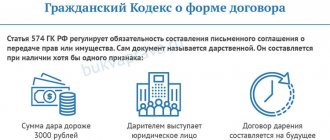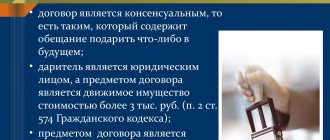According to Art. 572 of the Civil Code, a gift agreement is an agreement of the parties where the donor gratuitously transfers into the ownership of the donee any of his property, ownership rights or fulfills his property obligation. Gratuitousness is a fundamental characteristic of a gift, a violation of which, according to paragraph 1 of this article, should be considered a counter-obligation or representation of the donee in favor of the donor (transfer of funds in exchange for a gift, the assumption by the donee of an obligation to care for the donor, etc.). An agreement concluded with a similar condition that violates gratuitousness is not a valid donation - according to clause 2 of Art. 170 of the Civil Code, it contains all the signs of a sham transaction .
For your information
A feigned gift should be considered an agreement that contains elements of any other compensated transaction (if there is a fee for a gift - purchase and sale, if there is a duty of care - rent, etc.). As a rule, when concluding such a gift agreement, the parties aim to use it to cover up the true agreement that their will is aimed at.
A feigned gift agreement is void (absolutely invalid) by its nature and is recognized as such from the moment it is concluded by the parties. Therefore, according to paragraph 1 of Art. 167 of the Civil Code, it does not entail any legal consequences other than those entailed by its invalidity. In essence, this means that the parties who entered into it can refuse to fulfill the gift, since the obligations of the donor, just like the rights of ownership of the gift to the recipient, cannot arise.
The insignificance of a feigned donation entails its invalidity, regardless of the existence of a court decision to that effect (clause 1 of Article 166 of the Civil Code). Formally, this makes it possible to invalidate a feigned donation, which has obvious facts of the presence of a counter-representation on the part of the donee, out of court. However, in practice this loses all meaning, since the application of the consequences of invalidity without a trial is impossible.
As for a gift that does not have obvious evidence of remuneration (for example, the agreement did not contain a provision for a counter-representation, but the donee still transferred funds to the donor), then such pretense requires convincing proof . In relation to such transactions, the procedure for recognizing the invalidity of a void contract (clause 1 of Article 166 of the Civil Code) is not applicable.
The right to challenge a feigned donation, in accordance with paragraph 3 of Art. 166 of the Civil Code, are vested in its parties, as well as other interested parties specified in the law . The right to apply the consequences of invalidity to such a transaction is also vested in any third parties who have a protected interest in recognizing such invalidity. If a feigned donation violates any public interests, the court also has the right to apply consequences, on its own initiative (Clause 4, Article 166 of the Civil Code).
Pretentious giving has quite specific consequences. According to paragraph 2 of Art. 170 of the Civil Code, taking into account the essence and content of the transaction covered by a gift, the rules governing it can be applied to it, i.e. the parties may be obliged to conclude it or be recognized as already concluded.
Example
Citizen Orekhov intended to sell his private house. Having found a suitable buyer - citizen Mamedov, and agreed with him on the price, Orekhov offered him the following design - he promised to reduce the cost of the house by 50 thousand rubles if Mamedov agreed to conclude a deed of gift in his favor, instead of drawing up a sales contract. Orekhov proposed to transfer the money itself for the house by receipt, without mentioning it in the gift deed. Orekhov explained the need to conclude such a transaction by the fact that in case of purchase and sale, he would have to pay income tax, while in case of donation he would be exempt from it. For Mamedov, according to him, this would not entail any legal consequences. Since 50 thousand rubles was a lot of money for Mamedov, he agreed to the proposed option. After this, the parties drew up a gift agreement, registered it with a notary and re-registered it with the Rosreestr authorities.
After some time, Mamedov received a summons to summon him to the Federal Tax Service. Having appeared at the local tax office, Mamedov learned that the property he received as a gift from Orekhov was nothing more than income received by him (Article 208 of the Tax Code of the Russian Federation), which is subject to 13% personal income tax.
After listening to Mamedov’s story that the seller had set him up, employees of the Federal Tax Service advised him to go to court and challenge the gift agreement. Following the advice of tax officials, Mamedov drew up a statement of claim and filed it in court, demanding that the gift agreement between him and Orekhov be declared invalid.
At the court hearing, in support of his claim, Mamedov argued that his true intentions were aimed at concluding a sale and purchase agreement, but due to legal illiteracy and gullibility, the defendant convinced him to conclude a deed of gift.
In addition, he pointed out that Orekhov did not want to pay income tax and this is what justified the request to conclude a deed of gift. In support, the plaintiff presented the original receipt, according to which he transferred funds to Orekhov for the house he was buying.
Based on this and guided by paragraph 2 of Art. 170 of the Civil Code, the plaintiff asked the court to recognize the invalidity of the deed of gift due to the fact that it was used to cover up the purchase and sale, and also demanded to apply the consequences of a sham transaction - to recognize the donation as a purchase and sale and to apply the relevant provisions of the law to its regulation.
Based on the arguments presented by Mamedov, the court satisfied his demands in full.
The concept of a sham contract
According to paragraph 2 of Art. 170 of the Civil Code, a sham agreement should be considered any agreement, the purpose of which was not to achieve its legal result - it was concluded only to cover up any other transaction , including illegal or on other conditions. In turn, the absence of a legal result in the actions of the parties to legal relations contradicts the main features of a civil transaction (Article 153 of the Civil Code), which is why a sham agreement should be considered void (absolutely invalid).
Within the framework of a sham agreement, it is customary to distinguish between 2 transactions - covered and covering . A cover transaction is always void, regardless of whether its formal content complies with the law. The validity of the covered transaction is assessed in each particular case separately, depending on its essence, content and the possibility of applying the rules governing it to it.
Sham contracts always do not correspond to the true internal will of the parties who enter into them. Based on this, legal literature classifies them as transactions with vice of will , most of which are contestable.
Attention
According to paragraph 1 of Art. 167 of the Civil Code, any sham transaction is invalid from the moment of its completion. From a legal point of view, when concluding a sham contract, regardless of the actions of its parties, they still remain in the property position in which they were before its conclusion.
Most often, sham transactions are made by the parties in order to achieve any illegal consequences - circumventing regulatory prohibitions and restrictions, tax evasion, etc. At the same time, their external design, formal content, parties and other components may well have a legal appearance , which creates significant problems when challenging them.
The insignificant nature of a sham contract gives rise to a special procedure for recognizing its invalidity. According to paragraph 1 of Art. 166 of the Civil Code, the pretense of a transaction indicates its invalidity without recognition of this fact by the court . Thus, if the fact of sham is indisputable, when challenging such a transaction, the functions of the court are reduced only to the application of general or special consequences. However, if the fact of pretense requires proof, recognition of invalidity is possible only by a court decision.
Consequences of recognizing a gift agreement as imaginary
Since there are no special consequences of recognizing the gift agreement as imaginary, the provisions of Art. 170 of the Civil Code is not provided for, within the meaning of the law, one should be guided by the general consequences of invalidity established in paragraph 2 of Art. 167 of the Civil Code, which provides for bilateral restitution - the return by the parties to each other of everything they received under the concluded imaginary transaction.
Attention
Since an imaginary donation cannot contain compensation, the donor, when transferring property to the donee, does not receive anything in return. Thus, restitution applies only to the donee - he will have to return the gift to the donor.
However, when applying consequences, the nature of the imaginary nature :
- If the gift did not initially become the property of the donee, then he cannot return what he did not receive, according to which the general consequences of invalidity (clause 2 of Article 167 of the Civil Code) are not applicable to such a gift.
- In this case, the only consequence of the court determining that the gift agreement is sham is the fact that it is recognized as invalid. This consequence is of particular importance in cases where there is an imaginary donation that requires registration of rights, for example, a donation of real estate.
Time limit for challenging a sham contract
As is known, a sham agreement, by its nature, is initially void (Article 170 of the Civil Code), i.e. invalid from the moment of its conclusion. Based on this, it can be challenged by his party or another person interested in it . The possibility of challenging exists for such a person within a certain limitation period, which, according to Art. 181 of the Civil Code, is 3 years . This period is the same for absolutely all entities interested in challenging, regardless of the nature and essence of the covered and cover-up transactions, however, there are certain features of its course.
Important
For parties to a sham contract, the three-year period during which a challenge is possible begins from the moment the contract is executed. For other persons interested in challenging, the period begins from the moment when they learned or should have known about the beginning of execution.
However, regardless of when the interested party learned about the fact of execution of a sham transaction that violates its rights, the total period during which the contract can be challenged cannot exceed 10 years from the moment its execution began. This rule is objectively justified, since after the expiration of the specified period, the relevance and expediency of challenging the sham transaction is lost.
Meanwhile, if a party or interested person missed the statute of limitations due to exceptional circumstances, according to Art. 205 of the Civil Code, such a period can be restored . The restoration of the period for challenging is carried out exclusively by the court that is considering the claim for challenging and only if the reasons for missing this period are recognized by this court as valid.
The validity of the reasons for absence can be recognized by the court only if these reasons are directly related to the personality of the person concerned (illness, helpless state). In addition, recognition of respect is possible only if the specified exceptional circumstances occurred in the last six months of the statute of limitations .
If the specified three-year period has been missed without good reason, the interested party is deprived of the right to challenge the sham contract, regardless of the extent and manner in which his rights were violated.
Judicial practice | Court decision recognizing the apartment donation agreement as a sham transaction
Home >> Court decisions in civil cases >> Judicial practice | Court decision recognizing the apartment donation agreement as a sham transaction
SOLUTION
IN THE NAME OF THE RUSSIAN FEDERATION
On March 19, 2015, Moscow Golovinsky District Court of Moscow, composed of presiding judge O.V. Mrykhina, with secretary E.L. Oreshnikov, with the participation of lawyer Yu.A. Khovrachev, having considered civil case No. 2 in open court 1601/15 on the claim of FULL NAME2 to FULL NAME3 for recognition of the gift agreement as a sham transaction, termination of the agreement,
ESTABLISHED: The plaintiff, FULL NAME2, filed a lawsuit against the defendant, FULL NAME3, to recognize the donation agreement as a sham transaction, to terminate the contract, and requests that it be declared void as a sham transaction dated March 19, 2012. for the donation of Full Name 2 to the Defendant Full Name 3 room No. in the apartment at the address: <address>; admit that in fact, under the guise of an agreement dated March 19, 2012. donation FULL NAME2 to the defendant FULL NAME3 room No. at the address: <address>, between her and the defendant was 03/19/2012. a transaction was concluded for the sale of room No. to the defendant at the address: <address>, with the following conditions: the cost of the room <data seized>; the buyer, FULL NAME3, pays the seller, FULL NAME2, <data taken> per month, until full payment under the agreement dated March 19, 2012. for the purchased room; terminate the contract dated March 19, 2012. sale of FULL NAME2 to defendant FULL NAME3 room No. at the address: <address>. The plaintiff motivated her demands by the fact that she owned room No. in the apartment at the address: <address>. An agreement was reached between her and the defendant, her granddaughter, that she would sell her room to her granddaughter for <data taken>, and the defendant would pay this amount at <data taken> per month until full settlement. Since they are close relatives, for ease of registration, the transaction was formalized as a donation agreement for the room. Since October 2014 the defendant stopped making payments for the room due to the deterioration of her financial situation. Since for her the funds received from the sale of the apartment are her means of livelihood, she decided to sell the room to another relative.
The plaintiff, FULL NAME 2, her representative, lawyer FULL NAME 7, acting on the basis of a warrant, appeared at the court hearing and supported the stated claims in full according to the arguments set out in the claim.
Defendant FULL NAME3, her representative FULL NAME8, acting on the basis of a written statement, appeared at the court hearing, the defendant admitted the claims, explaining that in fact the plaintiff, who is her grandmother, sold her her room for <data taken>, which she paid monthly according to <data taken> Currently, her property situation does not allow her to make payments, and therefore, she is not able to pay the plaintiff the cost of the room in full.
The court, having heard the explanations of the plaintiff, her representative, and the defendant, and having checked and studied the materials of the case, considers the claims to be partially satisfied, on the following grounds.
According to clause 2 of Article 1 of the Civil Code of the Russian Federation, citizens (individuals) and legal entities acquire and exercise their civil rights of their own will and in their own interest. They are free to establish their rights and obligations on the basis of the contract and to determine any terms of the contract that do not contradict the law.
According to paragraph 3 of Article 10 of the Civil Code of the Russian Federation, in cases where the law makes the protection of civil rights dependent on whether these rights were exercised reasonably and in good faith, the reasonableness of the actions and the good faith of the participants in civil legal relations are assumed.
According to clause 1 of Article 166 of the Civil Code of the Russian Federation, a transaction is invalid on the grounds established by this Code, due to its recognition as such by the court (voidable transaction) or regardless of such recognition (void transaction).
According to clause 2 of Article 170 of the Civil Code of the Russian Federation, a sham transaction, that is, a transaction that was made with the aim of covering up another transaction, is void. To the transaction which the parties actually intended, taking into account the substance of the transaction, the rules relating to it apply.
According to Part 1 of Article 572 of the Civil Code of the Russian Federation, under a gift agreement, one party (the donor) gratuitously transfers or undertakes to transfer to the other party (the donee) an item of ownership or a property right (claim) to himself or to a third party, or releases or undertakes to release it from property obligations to yourself or to a third party.
According to Part 3 of Article 574 of the Civil Code of the Russian Federation, a real estate donation agreement is subject to state registration.
As established at the court hearing and follows from the case materials, FULL NAME2 was the owner of room No. in the apartment at the address: <address>.
03/19/2012 between FULL NAME2 and FULL NAME9 (after the marriage, FULL NAME3) a room donation agreement was concluded, in accordance with the terms of which FULL NAME2 freely transferred into the ownership of FULL NAME9 room No. 1, located in the apartment of the communal meeting at the address: <address> (case file 15) . State registration of the agreement was carried out on 04/06/2012, which is confirmed by an extract from the Unified State Register dated 02/17/2015. (case file 23).
From the plaintiff’s explanations at the court hearing it follows that the defendant, FULL NAME3, is her granddaughter. An agreement was reached between them that the granddaughter would buy a room from her in a communal apartment for <data taken>, and the money would be paid at <data taken> per month. They formalized the contract for the purchase and sale of the room as a donation agreement for the room, for ease of registration. Since October 2014 FULL NAME3 has stopped paying money, and therefore, she wants to terminate the contract for the sale and purchase of a room, drawn up as a gift agreement for a room.
From the defendant’s explanations at the court hearing, it follows that she agrees with the plaintiff’s arguments, and the plaintiff undertook to return the “data taken” for the room to her. Since the relationship between her and the plaintiff is related and of a confidential nature, they did not draw up any receipts.
Thus, based on the circumstances of the conclusion of the controversial transaction, the specifics of the terms of the transaction, the results of the execution of the transaction, when concluding the Agreement for the Donation of a Room dated March 19, 2012, the will of the parties was aimed at achieving other legal consequences than those that directly follow from the gift agreement. The indicated controversial transaction concluded between Full Name2 and Full Name3 actually covered the contract for the sale and purchase of a room.
In such circumstances, assessing the evidence in its entirety, taking into account the explanations of the defendant, who admitted the claims, the court comes to the conclusion that the demands of the plaintiff, Full Name 2, to recognize the agreement for the donation of a room dated March 19, 2012, concluded between her and Full Name 3, as a sham transaction, committed in order to cover up the contract for the sale and purchase of a room are subject to satisfaction.
In accordance with paragraph 6 of the Resolution of the Plenum of the Supreme Court of the Russian Federation dated <date> N 11 “On the preparation of civil cases for trial”, when determining the law and other regulatory legal act that should be followed in resolving the case, and establishing the legal relations of the parties, one should have It means that they must be determined based on the totality of data: the subject and basis of the claim, the defendant’s objections to the claim, and other circumstances that have legal significance for the correct resolution of the case.
Since the basis of the claim is factual circumstances, the plaintiff’s indication of a specific legal norm in support of the claim is not decisive when the judge decides the question of which law should be followed when resolving the case.
According to clause 1 of Article 549 of the Civil Code of the Russian Federation, under an agreement for the purchase and sale of real estate (real estate sale agreement), the seller undertakes to transfer a land plot, building, structure, apartment or other real estate into the ownership of the buyer (Article 130).
According to Article 550 of the Civil Code of the Russian Federation, a contract for the sale of real estate is concluded in writing by drawing up one document signed by the parties (clause 2 of Article 434).
Failure to comply with the form of the contract for the sale of real estate entails its invalidity.
According to clause 1 of Article 551 of the Civil Code of the Russian Federation, the transfer of ownership of real estate under a real estate sale agreement to the buyer is subject to state registration.
According to clause 1 of Article 555 of the Civil Code of the Russian Federation, a contract for the sale of real estate must provide for the price of this property. If the contract does not contain a condition agreed upon in writing by the parties regarding the price of the real estate, the contract for its sale is considered not concluded. In this case, the rules for determining the price provided for in paragraph 3 of Article 424 of this Code do not apply.
As can be seen from the disputed room donation agreement dated March 19, 2012, it does not contain the essential conditions provided for by the above provisions of the Civil Code of the Russian Federation, it was registered as a room donation agreement, therefore, this transaction as a room purchase and sale agreement is void.
According to Article 167 of the Civil Code of the Russian Federation 1. An invalid transaction does not entail legal consequences, with the exception of those related to its invalidity, and is invalid from the moment of its completion.
2. If the transaction is invalid, each party is obliged to return to the other everything received under the transaction, and if it is impossible to return what was received in kind (including when what was received is expressed in the use of property, work performed or service provided), reimburse its value in money - if other consequences of the invalidity of the transaction are not provided for by law.
According to paragraph 2 of Article 166 of the Civil Code of the Russian Federation, a requirement to recognize a voidable transaction as invalid can be presented by the persons specified in this Code.
A demand for application of the consequences of invalidity of a void transaction may be made by any interested party. The court has the right to apply such consequences on its own initiative.
Under such circumstances, since the legal consequence of declaring transactions invalid, in accordance with Article 167 of the Civil Code of the Russian Federation, is the return by the parties to each other of everything received under the transaction, the court finds no grounds for satisfying the plaintiff’s demands for termination of the purchase and sale agreement dated March 19, 2012. room No. at the address: <address>, since the consequences of the invalidity of a void transaction are subject to application, namely, cancellation of the record of ownership FULL NAME3 (FULL NAME10) FULL NAME4 for room No. in the apartment located at the address: <address>, in the Unified State Register rights to real estate and restoration of the record of ownership of Full Name 2 for room No. 1, located in the apartment at the address: <address>.
Based on the aforesaid and guided by Article. Art. 194-199 Code of Civil Procedure of the Russian Federation,
DECIDED: To invalidate the Room Donation Agreement dated <date>, concluded between Full Name 2 and Full Name 3 (Full Name 10) Full Name 4 in relation to room No. in the apartment located at: <address>.
Terminate the ownership right of Full Name 3 (Full Name 10) Full Name 4 to room No. in the apartment located at: <address>.
Recognize the ownership of room No. 1, located in the apartment at the address: <address>, for Full Name 2, from the moment the court decision enters into legal force.
The decision is the basis for clearing the record of ownership of Full Name 3 (Full Name 10) Full Name 4 for room No. in the apartment located at: <address>, in the Unified State Register of Rights to Real Estate and restoring the record of ownership of Full Name 2 for room No. 1 located in the apartment at: <address>.
Services of lawyers and attorneys in Moscow (South-Western Administrative District) If you are interested in recognizing an apartment donation agreement as a sham transaction, you can contact us, as this is one of our areas of activity. For more than 15 years, we have been terminating apartment donation (purchase and sale) agreements in court.
The procedure for challenging a sham gift agreement
As already mentioned, a sham agreement, due to its initial nullity, is invalid from the moment of its completion (Article 166 of the Civil Code). Thus, all cases of feigned donation, which include indisputable evidence of feignment (for example, a counter-representation or an obligation of the donee specified in the contract), formally require recognition of their invalidity by the court. However, if the sham of a donation is not obvious to the court and other persons, the invalidity of such an agreement requires convincing proof .
According to Art. 56 of the Code of Civil Procedure, the person who requests the court to recognize the invalidity of a feigned donation has the burden of proving the circumstances to which he refers to justify the feigned transaction.
The procedure for recognizing a gift as feigned
The recognition of a gift as feigned and the application of the consequences of its invalidity to it is carried out by the court in the manner of claim proceedings . The recognition procedure itself inevitably requires the interested party to go through several standard stages:
- Legal consultation . Judicial practice on recognizing feigned gift agreements as invalid is ambiguous. Proving the sham of a gift requires scrupulousness in studying a specific situation, legal analysis of documents and persuasiveness in substantiating one’s claims. Therefore, in the absence of the necessary skills and knowledge for this, it is advisable for the interested person to seek help or advice from specialists.
- Collection of evidence of pretense and preparation of documents . Since the burden of proof lies with the party interested in the challenge, it needs to prepare a number of documents to substantiate its position. This can be any documentary evidence confirming the paid nature of the donation or any other evidence of covering up another transaction with a donation. By the way, evidence can be not only documentary - to substantiate the pretense, the interested party is provided with the entire range of civil legal methods of proof (Chapter 6 of the Code of Civil Procedure). In addition to documentary evidence, a number of standard documents specified in Art. 132 Code of Civil Procedure.
- Payment of state duty . Before filing a statement of claim, the plaintiff must pay the state fee, and attach the payment receipt to the statement of claim itself (Article 132 of the Code of Civil Procedure). Since the recognition of the invalidity of a feigned donation is of a non-property nature, the amount of the state duty, according to Art. 333.19 of the Tax Code, amounts to 300 rubles for citizens and 6 thousand rubles for organizations . If this requirement is ignored, the court leaves the claim without progress and sets a period during which the plaintiff must pay the state fee and submit a document confirming this (Article 136 of the Code of Civil Procedure).
- Drawing up and filing a statement of claim in court . In the statement of claim submitted to the court, it is necessary to describe in detail all the circumstances of the feigned donation, indicate the facts that prove its feignedness, support them with a reference to the norms of the law, indicate why the plaintiff’s rights were violated and express the claims in accordance with the consequences specified in Art. . Art. 167, 170 Civil Code. The filing of the statement of claim itself, with all the documents attached to it, is carried out in court at the place of residence or location of the defendant (Article 28 of the Code of Civil Procedure).
- Judicial review . As part of the judicial review, the interested person must fully support his position and demands, provide additional evidence, if necessary or impossible to obtain it on his own, request the court to request it, present his conclusions and justify them, as well as exercise his other procedural rights. If necessary, the interested party may apply for the involvement of witnesses, specialists, experts and other persons. The court decision, which is made based on the results of the consideration of the case, will depend on the completeness of the evidence and the activity of the interested party.
- Execution of the decision . If the court has satisfied the demands of the interested party, recognized the gift agreement as fraudulent and applied the consequences of its invalidity, the stage of execution of the decision begins. There are two possible scenarios here - voluntary and forced execution . Thus, if the defendant avoids voluntary execution of a court decision, the plaintiff must initiate enforcement proceedings. As part of this, bailiffs will enforce the court decision.
Required documents
The list of documents required when filing a claim is expressly established by Art. 132 Code of Civil Procedure. Among them, when challenging a feigned gift agreement, you will need:
- A copy of the document confirming the identity of the plaintiff;
- Copies of the statement of claim;
- Document confirming payment of state duty;
- Copies of the contested gift agreement;
- Copies of documentary evidence (certificates, receipts, letters, expert opinions, etc.);
- Power of attorney in case of participation of a representative.
Please note that the number of copies of the statement of claim, gift agreement and documentary evidence directly depends on the number of defendants and third parties in the lawsuit. The above list is purely approximate and, depending on the specifics of the case, can be expanded.
Termination of the gift agreement
As for the right to demand in court the termination of a gift agreement, it can only be exercised by a party to the agreement or its representative, in contrast to the invalidation of a gift agreement, which can be declared by any interested party. One of the grounds for terminating a gift agreement, based on an analysis of judicial practice, may be the recipient’s refusal to accept the gift.
One such interesting example of judicial practice is the ruling of the Court of Appeal of the Bryansk Regional Court in case No. 33-2021/2015. In the course of judicial proceedings, it was established that the plaintiff applied to the court with a demand from the defendants to accept the refusal of the gift and terminate the gift agreement. The court rejected the plaintiff's request to terminate the gift agreement. The basis for the refusal was that the plaintiff actually accepted the gift (a house with a plot of land), and the actions of the parties were aimed at creating legal relations defined by the agreement and gave rise to all the legal consequences of the agreement. After accepting the house as a gift, the plaintiff attempted to draw up documents for the delivery of real estate to the state for appropriate compensation under the Chernobyl program, and only after the refusal of the right to receive such compensation did the recipient file a lawsuit. Since the defendants in the lawsuit did not object to the termination of the contract and the acceptance of the refusal of the gift, the court did not see in these legal relations the existence of a dispute that must be resolved in court. For these reasons, the court issued a corresponding ruling.
Consequences of recognizing a gift as a sham transaction
According to the general rule provided for in paragraph 2 of Art. 167 of the Civil Code, if a gift transaction is recognized as feigned, the general consequence of invalidity must be applied to it - the mutual return of everything received under the transaction. Since the sham of a gift is most often recognized as a violation of gratuitousness, bilateral restitution is applicable to both parties to the transaction . Thus, the donor receives his gift back, and the recipient receives a counter-representation given in exchange for the gift.
Additionally
The rules for the mutual return of everything received apply not only to material things or rights, according to Art. 167 of the Civil Code, it is applicable to work performed, service, duty, etc. In this case, the party must reimburse the cost of the work performed, services, etc.
However, the rules of mutual return are applied only in cases where no other special consequences of invalidity have been established or their application is impossible. In relation to feigned donation, according to paragraph 2 of Art. 170 of the Civil Code, the legislator requires those rules that regulate the covered transaction .
Thus, when recognizing the sham of a donation, if the content and essence of the covered transaction corresponds to the norms that govern it, the court may well oblige the parties to conclude exactly the covered transaction, or recognize it as concluded . Of course, when making such a decision, the requirements and interests of the plaintiff, as well as other individual characteristics of a particular case, should be taken into account.
If the covered transaction is also invalid, then the application of the general consequences of invalidity seems inevitable . In practice, the issue of the sham of a donation and the application of appropriate consequences to it is decided taking into account all subjective and objective circumstances, the opinions of the parties, and the subjects interested in challenging it.
A sham deal from the legislator's point of view
According to the current legislation, namely Article 572 of the Civil Code of the Russian Federation, a gift is understood as an agreement of the parties in which the donor gratuitously reduces his property in favor of the property of the donee, transferring to him certain property benefits or rights on a voluntary basis.
It is the gratuitousness of the transaction that refers to the main characteristic features of the gift agreement, and as a violation of this basis, according to paragraph 1 of the same Article 572 of the Civil Code of the Russian Federation, the presence in the deed of gift of a counter obligation or the transfer by the donee to the donor instead of a gift of any benefits, rights, services can be considered etc.
Thus, contracts that are concluded with one or more of the conditions listed above that violate legislative norms, in accordance with paragraph 2 of Article 170 of the Civil Code, are not considered valid due to the content of signs of a sham transaction.
Expert opinion
Oleg Ustinov
Practicing lawyer, author of the website “Legal Ambulance”, one of the co-founders of the “Our Future” foundation.
Thus, a deed of gift, the content of which contains elements related to any other compensated transaction (for example, if there is a condition to provide care - annuity, and if there is a cost and payment for the gift - purchase and sale), can be considered a sham donation. Based on our practice, we note that most of these transactions are aimed at covering up the real transaction, which is the main one for the parties.
Any feigned gift agreement is initially void, that is, it is invalid by its nature and is recognized as such at the moment of conclusion of the transaction between the donor and the recipient. Therefore, based on the information contained in paragraph 1 of Article 167, it cannot bear any legal consequences for the parties to the transaction, except for those directly related to its invalidity.
Simply put, this means that both the donor and the donee have the opportunity to refuse to execute such a deed of gift, because when it was concluded, no legal rights and obligations were formed for either party.
It is worth noting that the nullity of a sham transaction entails the invalidity of the gift agreement, according to paragraph 1 of Article 166 of the Civil Code of the Russian Federation, regardless of whether the corresponding court decision was made or not. In essence, this fact makes it possible to invalidate a gift if violative elements of the transaction are discovered (for example, when studying a written agreement, a notary sees the price for the gift indicated by the donor) out of court. But, in practice, this makes no sense, because it is not possible to apply the consequences of a sham transaction without a court decision.
Regarding gift agreements that do not have obvious violations (evidence of compensation for the transaction), for example, those that do not contain any conditions for a counter-representation, but the money was transferred “from hand to hand” - the interested party will have to prove this pretense in court . At the same time, in relation to the transactions described, the procedure established by the legislator for recognizing a transaction as void, in accordance with paragraph 1 of Article 166 of the Civil Code of the Russian Federation, is not applicable.
Lawyer's Note
Also, it is worth noting that, according to paragraph 3 of Article 166 of the Civil Code of the Russian Federation, the right to challenge the contract in question is vested not only in the donor and the donee, but also in others interested in exposing the truth.
In addition, the legal right to apply the consequences of invalidity to a feigned gift transaction is vested in third parties who have a protected interest in declaring the contract invalid. Also, according to paragraph 4 of Article 166 of the Civil Code, if such a transaction violates public interests, the court can apply legal consequences on its own initiative.
Disclosure of a sham transaction can have very specific, from a legal point of view, consequences for the parties. Thus, according to the norms established by paragraph 2 of Article 170 of the Civil Code of the Russian Federation, taking into account the content and essence of the transaction covered by a real gift, the donor and the donee may be required to conclude this transaction, following the established legislative norms, or consider a real transaction concluded instead of a gift.
ARTICLE RECOMMENDED FOR YOU:
Form of gift agreement: oral, simple written, notarial
An example from the practice of our lawyers
Citizen M. wanted to sell her own private house outside the city. Having found through an advertisement a suitable buyer for her in the person of citizen O., she offered him the following design - M. would reduce the price by 50,000 Russian rubles if O. agreed to formalize everything as a donation in his favor, instead of the purchase and sale necessary for these purposes. For the sake of “reliability,” M. offered to transfer the entire amount for the house to her by receipt, without mentioning the funds in the contents of the gift agreement.
At the same time, M. motivated the need for this structure by the fact that when registering a sale and purchase, she will need to pay mandatory income tax, while when concluding a donation, payment can be avoided. In addition, in this situation, no legal consequences will be applied to O. and all the blame will fall on M. Since 50,000 rubles is a rather large amount for O., he agreed, the transaction was carried out as a donation with the involvement of the notary M., and after , re-registered ownership from the donor to the donee in Rosreestr.
A few months later, O. was summoned by the Federal Tax Service, in which the agency’s employees explained to him that the real estate he received from M., according to Article 208 of the Tax Code of the Russian Federation, is the income he received, subject to personal income tax in 2020 (13% of the total cost).
After listening to O.’s explanations that M. had set him up, employees of the Federal Tax Service recommended that he file a corresponding statement of claim with the judicial authorities, which he did. During the trial, O. stated that in fact, he wanted to carry out a purchase and sale transaction, but due to gullibility and lack of experience in resolving legal issues, he succumbed to the defendant’s persuasion. At the same time, O. said that M. did not want to pay the tax and presented the original receipt according to which he gave her money for the house.
Guided by information from paragraph 2 of Article 170 of the Civil Code of the Russian Federation, applicant O. demanded that the deed of gift be declared invalid on the basis of the pretense of the transaction and asked the court to recognize it as a purchase and sale, applying the norms established by the legislator to the agreement.
After analyzing all the evidence and arguments of O., the court satisfied all of the plaintiff’s requirements listed above in full.








